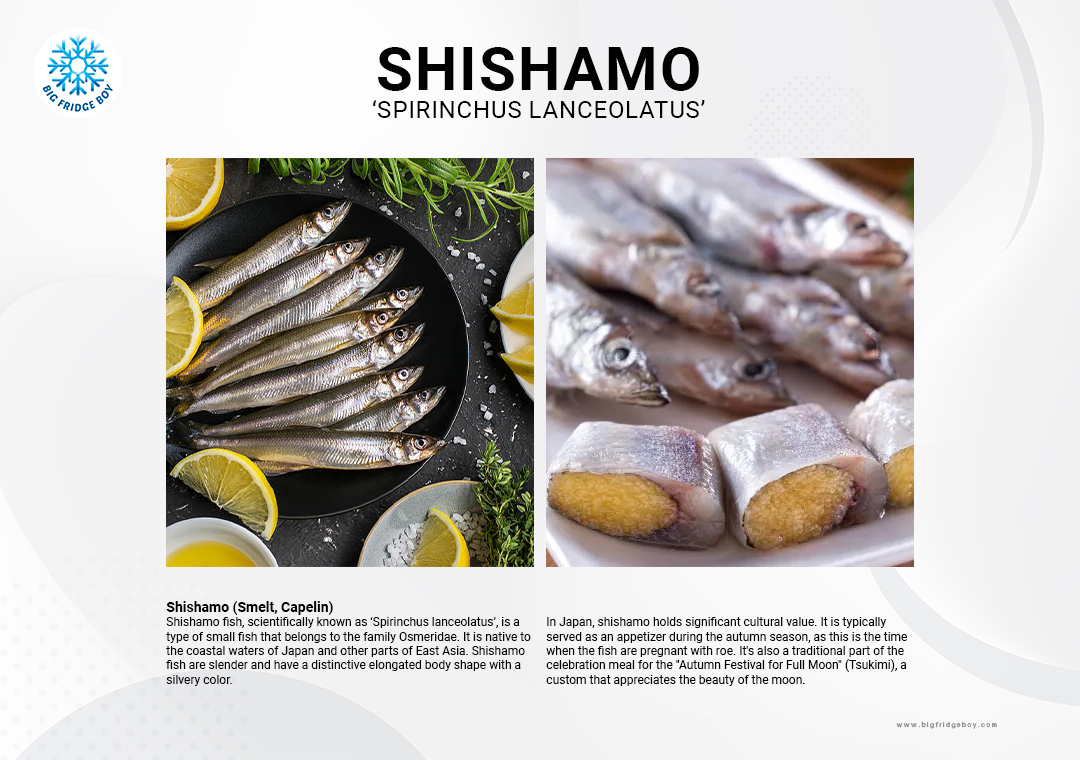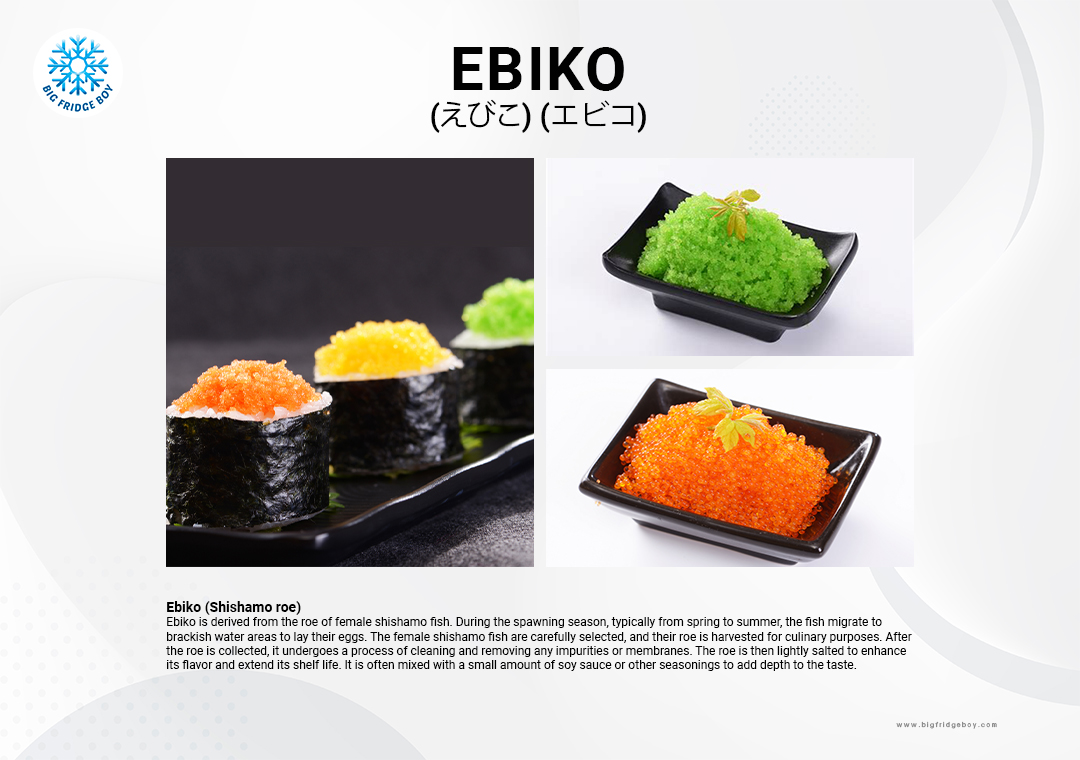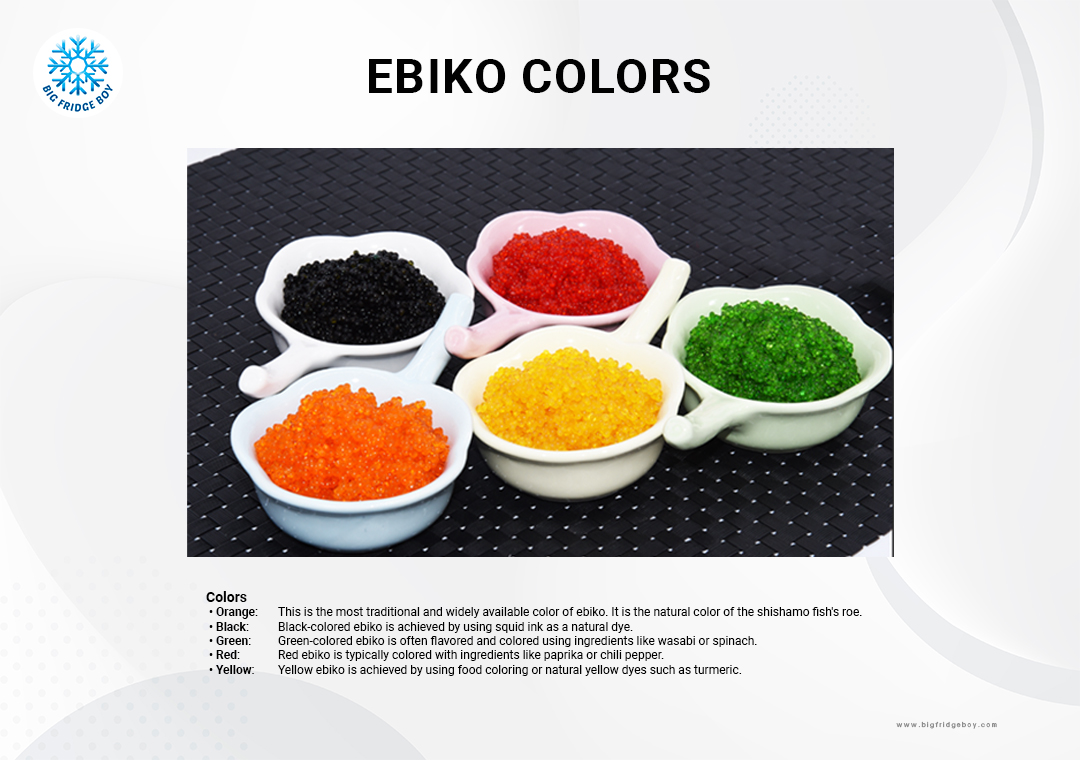"Ebiko: The Shrimp Roe That's Actually Made From Fish"
Last updated: 25 Jul 2023 | 7435 Views |

Ebiko (えびこ) (エビコ), typically understood as the roe of shrimp, is a staple in Japanese cuisine. However, in this case, we are referring to the roe from a fish called ‘shishamo’, also known as smelt or capelin.

Shishamo
Shishamo fish, scientifically known as ‘Spirinchus lanceolatus’, is a type of small fish that belongs to the family Osmeridae. It is native to the coastal waters of Japan and other parts of East Asia. Shishamo fish are slender and have a distinctive elongated body shape with a silvery color.
The name 'shishamo' is derived from the Ainu language of the indigenous people in Japan, meaning "pregnant with a lot of fish".
In Japan, shishamo holds significant cultural value. It is typically served as an appetizer during the autumn season, as this is the time when the fish are pregnant with roe. It's also a traditional part of the celebration meal for the "Autumn Festival for Full Moon" (Tsukimi), a custom that appreciates the beauty of the moon.

Ebiko
Ebiko is derived from the roe of female shishamo fish. During the spawning season, typically from spring to summer, the fish migrate to brackish water areas to lay their eggs. The female shishamo fish are carefully selected, and their roe is harvested for culinary purposes. After the roe is collected, it undergoes a process of cleaning and removing any impurities or membranes. The roe is then lightly salted to enhance its flavor and extend its shelf life. It is often mixed with a small amount of soy sauce or other seasonings to add depth to the taste. Ebiko roe is small in size. Each roe is spherical and has a slightly transparent outer membrane.
Culinary Versatility
Ebiko is a versatile ingredient that can be used in various dishes to add flavor, texture, and visual appeal. Apart from sushi rolls, it can be sprinkled over nigiri sushi, sashimi, salads, rice bowls, and even incorporated into sauces or dressings. Its crunchy texture and briny flavor complement a wide range of seafood and vegetable preparations.
Nutritional Benefits
Shishamo, including its roe, is a powerhouse of nutrition. It's an excellent source of protein and is rich in essential omega-3 fatty acids, which are known to support heart health. The roe also contains a substantial amount of vitamins and minerals, including Vitamin D, B12, and selenium. Enjoying shishamo is not just a gastronomical delight, it's also a healthful choice!

Ebiko Colors
While the most commonly seen color of ebiko is orange, it is also available in various other colors. The different colors are achieved through the addition of natural or artificial food dyes during the processing of the roe. Here are some of the common colors of ebiko.
- Orange: This is the most traditional and widely available color of ebiko. It is the natural color of the shishamo fish's roe.
- Black: Black-colored ebiko is achieved by using squid ink as a natural dye. It adds a unique visual contrast and a subtle savory flavor to dishes.
- Green: Green-colored ebiko is often flavored and colored using ingredients like wasabi or spinach. It provides a vibrant and visually appealing touch to sushi rolls and other dishes.
- Red: Red ebiko is typically colored with ingredients like paprika or chili pepper.
- Yellow: Yellow ebiko is achieved by using food coloring or natural yellow dyes such as turmeric. It provides a bright and cheerful appearance to dishes.
The availability of different colored ebiko may vary depending on the region and the specific brand or manufacturer. The use of colored ebiko allows for creative presentations and adds visual interest to dishes, making them more appealing to the eye.
Remember to consider individual dietary restrictions or allergies before consuming ebiko, as it is derived from seafood. Enjoying ebiko in moderation as part of a balanced diet can enhance your culinary experience and provide nutritional value.







